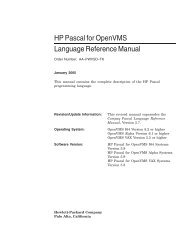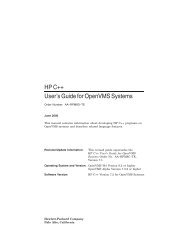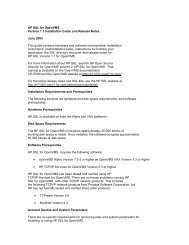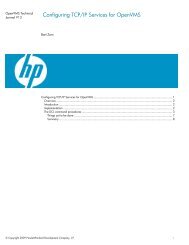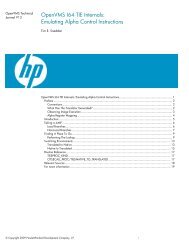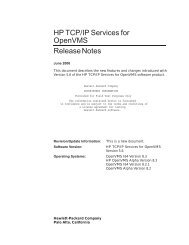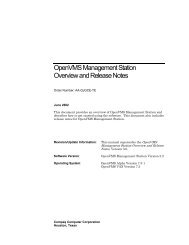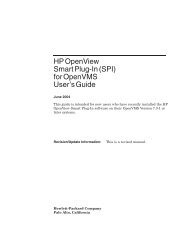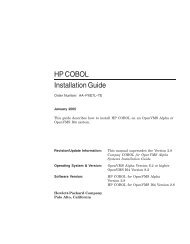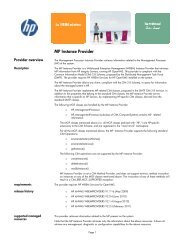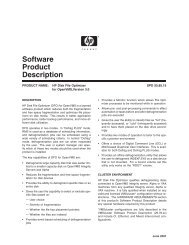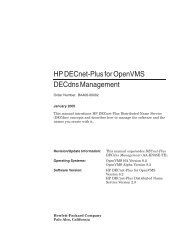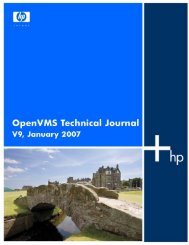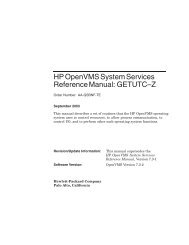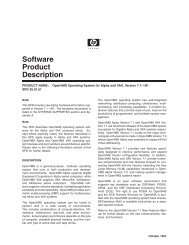HP Archive Backup System for OpenVMS Guide to Operations
HP Archive Backup System for OpenVMS Guide to Operations
HP Archive Backup System for OpenVMS Guide to Operations
Create successful ePaper yourself
Turn your PDF publications into a flip-book with our unique Google optimized e-Paper software.
1<br />
Introduction<br />
The <strong>Archive</strong> <strong>Backup</strong> <strong>System</strong> <strong>for</strong> <strong>OpenVMS</strong> (ABS) is a software product that allows you <strong>to</strong> save<br />
and res<strong>to</strong>re data in a heterogeneous environment. ABS provides you with the ability <strong>to</strong> per<strong>for</strong>m<br />
anything from full system backup operations <strong>to</strong> user-requested or user-created backup operations.<br />
ABS ensures data safety and integrity by providing a secure environment <strong>for</strong> save and<br />
res<strong>to</strong>re operations.<br />
ABS is based on an <strong>OpenVMS</strong> system environment and all data is saved <strong>to</strong> (and res<strong>to</strong>red from)<br />
archives on <strong>OpenVMS</strong> systems. However, ABS supports saving and res<strong>to</strong>ring data that resides<br />
on nodes running the UNIX and Windows operating systems, as well as <strong>OpenVMS</strong> systems.<br />
ABS enables you <strong>to</strong> implement a backup policy that allows you <strong>to</strong> save the data through au<strong>to</strong>matic<br />
or repetitively scheduled save operations. It also enables you <strong>to</strong> save data randomly using<br />
a one-time-only save operation. ABS allows you <strong>to</strong> use different scheduler interface options <strong>to</strong><br />
schedule requests. This feature allows you <strong>to</strong> cus<strong>to</strong>mize the scheduling of save or res<strong>to</strong>re<br />
requests <strong>to</strong> your system configuration.<br />
Save and res<strong>to</strong>re operations are accomplished using two of the objects recognized by ABS, the<br />
save request and the res<strong>to</strong>re request. These objects allow you <strong>to</strong> save data from online <strong>to</strong> either a<br />
offline volume or <strong>to</strong> another disk, and if necessary, allows you <strong>to</strong> res<strong>to</strong>re that data <strong>to</strong> either its<br />
original location or <strong>to</strong> a different output location.<br />
ABS tracks the location of data when saved as a result of an ABS save request. This in<strong>for</strong>mation<br />
is kept in an ABS catalog. Upon request, ABS accesses the catalog <strong>to</strong> locate or res<strong>to</strong>re the data.<br />
Chapter 2 provides an overview of ABS capabilities, and Chapter 3 describes ABS Save and<br />
Res<strong>to</strong>re operations, and the associated ABS objects, in more detail.<br />
ABS is integrated with Media, Device and Management Services (MDMS), which per<strong>for</strong>ms the<br />
following functions on behalf of ABS:<br />
• Database Management Services - MDMS maintains the ABS database objects including<br />
saves, res<strong>to</strong>res, archives, environments, catalogs, schedules and selections. Database management<br />
services are available within a distributed environment using either TCP/IP or<br />
DECnet communication pro<strong>to</strong>cols. Chapter 3 describes the ABS objects in detail.<br />
• Media Management Services - MDMS maintains a set of physical and logical objects <strong>for</strong><br />
management of backup hardware and media. These objects include domain, locations,<br />
nodes, groups, jukeboxes, drives, media types, pools, volumes and magazines. Chapter 4<br />
describes Media Management Services in detail.<br />
• Scheduling Services - MDMS provides extensive internal scheduling services <strong>for</strong> au<strong>to</strong>matically<br />
scheduling ABS save and res<strong>to</strong>re requests. Chapter 3 describes Scheduling Services.<br />
• Security Services - MDMS provides flexible security options using rights, privileges and<br />
object access control <strong>for</strong> secure use in a distributed environment. Chapter 5 describes security<br />
services.<br />
Introduction 1–1



